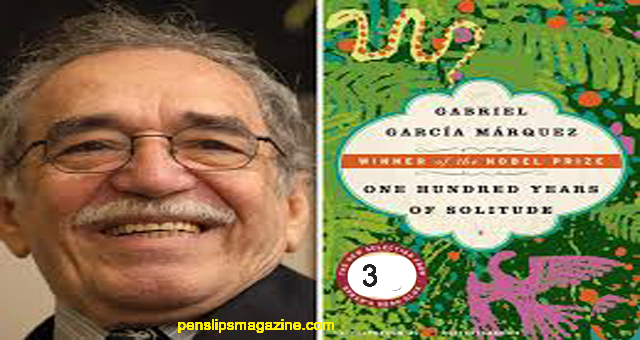
One Hundred Years of Solitude … Garcia Marquez
GABRIEL GARCIA MARQUEZ was born in Aracataca, Colombia in 1928, but he lived most of his life in Mexico and Europe. He attended the University of Bogota and later worked as staff reporter and film critic for the Colombian newspaper El Espectador. In addition to ONE HUNDRED YEARS OF SOLITUDE, he has also written two collections of short fiction, NO ONE WRITES TO THE COLONEL and LEAF STORM. Penslips Magazine intends to present this novel regularly.
ONE HUNDRED YEARS OF SOLITUDE
TRANSLATED FROM THE SPANISH
BY GREGORY RABASSA
ONE HUNDRED YEARS OF SOLITUDE
CHARACTERS
Jort Areadio BoendUi
m. Cnula Iguarln , olonel Aurellano Btiendia-,
-Jos6 Areadio
m-Rebeca , m. Remcdios Moscote. Remcdios Moscote , Aurcliano Jose , Aurelianos,
THREE
When the gypsies came back, Ursula had turned the whole population of the village against them.
But curiosity was greater than fear, for that time the gypsies went about the town making a
deafening noise with all manner of musical instruments while a hawker announced the exhibition of
the most fabulous discovery of the Naciancenes. So that everyone went to the tent and by paying
one cent they saw a youthful Melquiades, recovered, unwrinkled, with a new and flashing set of
teeth. Those who remembered his gums that had been destroyed by scurvy, his flaccid cheeks, and
his withered lips trembled with fear at the final proof of the gypsy’s supernatural power. The fear
turned into panic when Melquiades took out his teeth, intact, encased in their gums, and showed
them to the audience for an instant—a fleeting instant in which he went back to being the same
decrepit man of years past—and put them back again and smiled once more with the full control of
his restored youth. Even Jose Arcadio Buendia himself considered that Melquiades’ knowledge had
reached unbearable extremes, but he felt a healthy excitement when the gypsy explained to him
atone the workings of his false teeth. It seemed so simple and so prodigious at the same time that
overnight he lost all interest in his experiments in alchemy. He underwent a new crisis of bad
humor. He did not go back to eating regularly, and he would spend the day walking through the
house. “Incredible things are happening in the world,” he said to Ursula. “Right there across the
river there are all kinds of magical instmments while we keep on living like donkeys.” Those who
had known him since the foundation of Macondo were startled at how much he had changed under
Melquiades’ influence.
At first Jose Arcadio Buendia had been a kind of youthful patriarch who would give instructions
for planting and advice for the raising of children and animals, and who collaborated with everyone,
even in the physical work, for the welfare of the community. Since his house from the very first had
been the best in the village, the others had been built in its image and likeness. It had a small, well-
lighted living roost, a dining room in the shape of a terrace with gaily colored flowers, two
bedrooms, a courtyard with a gigantic chestnut tree, a well kept garden, and a corral where goats,
pigs, and hens lived in peaceful communion. The only animals that were prohibited, not just in his
house but in the entire settlement, were fighting cocks.
Ursula’s capacity for work was the same as that of her husband. Active, small, severe, that woman
of unbreakable nerves who at no moment in her life had been heard to sing seemed to be
everywhere, from dawn until quite late at night, always pursued by the soft whispering of her stiff,
starched petticoats. Thanks to her the floors of tamped earth, the unwhitewashed mud walls, the
rustic, wooden furniture they had built themselves were always dean, and the old chests where they
kept their clothes exhaled the warm smell of basil.
Jose Arcadio Buendia, who was the most enterprising man ever to be seen in the village, had set
up the placement of the houses in such a way that from all of them one could reach the river and
draw water with the same effort, and he had lined up the streets with such good sense that no house
got more sun than another during the hot time of day. Within a few years Macondo was a village
that was more orderly and hard working than any known until then by its three hundred inhabitants.
It was a truly happy village where no one was over thirty years of age and where no one had died.
Since the time of its founding, Jose Arcadio Buendia had built traps and cages. In a short time he
filled not only his own house but all of those in the village with troupials, canaries, bee eaters, and
redbreasts. The concert of so many different birds became so disturbing that Ursula would plug her
ears with beeswax so as not to lose her sense of reality. The first time that Melquiades’ tribe arrived,
selling glass balls for headaches, everyone was surprised that they had been able to find that village
lost in the drowsiness of the swamp, and the gypsies confessed that they had found their way by the
song of the birds.